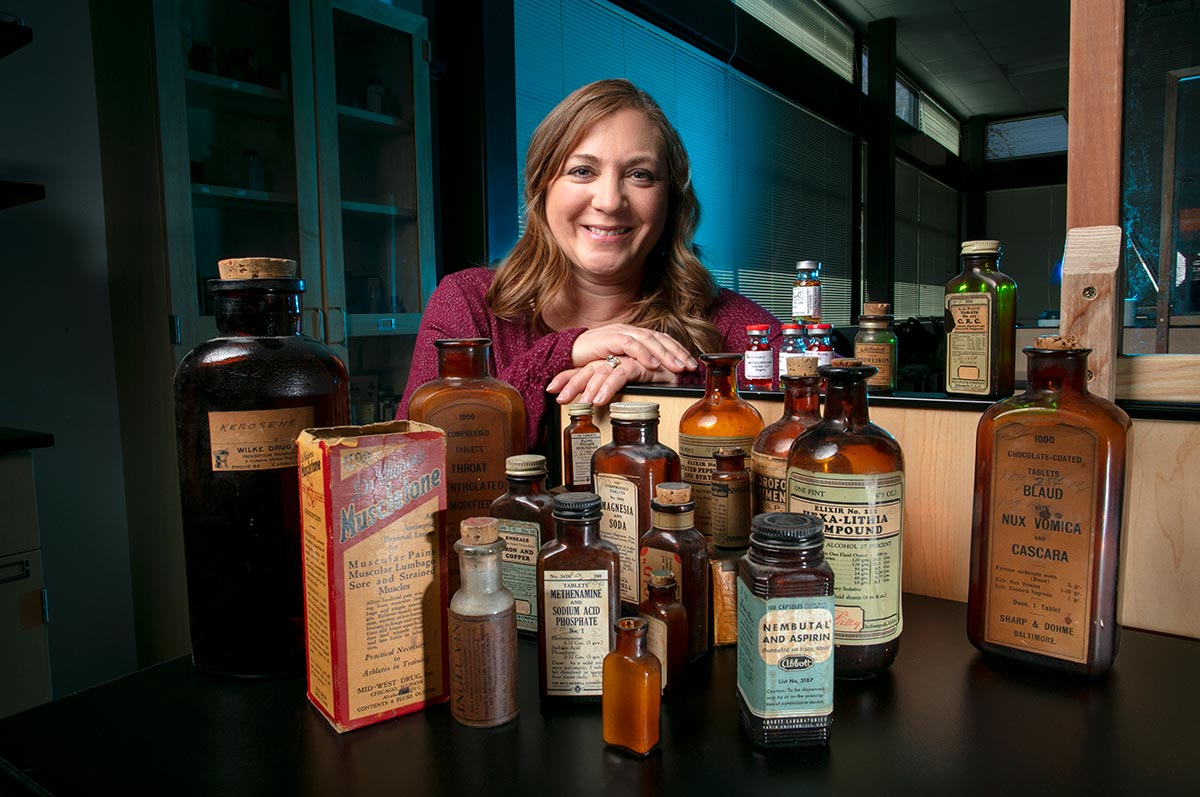Vaccine Booster
Around Regis, Stephanie James, Ph.D., MBA, is known as a vaccine warrior.
She has other titles, too. Associate professor in the Department of Pharmaceutical Sciences in the School of Pharmacy. COVID-19 testing site organizer. COVID-19 vaccine clinic organizer. Contributing writer for The Denver Post’s YourHub section. Go-to witness when Colorado lawmakers need an expert to weigh in on the science of vaccines.
And one more: “Absolute rock star,” offered by Samit Shah, Ph.D., pharmacy school dean. When the pandemic emerged in Colorado, James spearheaded the effort to set up testing on campus, Shah said. “She had to coordinate insurance billing and a lot of things outside her comfort zone. Many of us said, ‘we’ll support you, but I don’t know how you’ll pull this off.’ But she did.”
James is tireless in her efforts, through articles she writes and direct advocacy, to educate the public that vaccines are safe, and that they work. That’s earned her the admiration of colleagues and the science community. It’s also earned her the enmity of those who disagree with her.
James harbors no illusions that a few words from her, even backed by science, will erase years of conspiracy theories and misinformation. “You can tell [vaccine opponents] the sky is blue, but if they believe it’s red, I don’t know how to change that.”
But for vaccine vacillators, James hopes she, and facts, will prove persuasive. “All I can do is put out appropriate messaging and provide relevant, interesting and scientifically accurate information to individuals who have concerns,” she said. She has her work cut out for her: Colorado often ranks last in the nation in the percentage of children who are fully vaccinated against diseases like measles, mumps and rubella when they enter kindergarten.
That she’s made a name for herself on campus and beyond as a vaccine advocate is a little ironic, since her background is not in pharmacy, but viruses and infectious disease. Her research focuses on the impact of infectious diseases on people with Down Syndrome.
Interacting with parents of children with disabilities has given her a measure of empathy for those who fear vaccines, or who believe — despite reams of scientific evidence to the contrary — one of the most common misperceptions about vaccines: that they cause autism. “With autism, you want so badly to know why it happens. And if you don’t get the ‘why,’ it’s easy to latch onto something, anything,” that offers an explanation, she said.

James suspects another contributor to vaccine skepticism might be that, until last year, few Americans had experienced the devastation diseases like smallpox or polio wreaked in the past. In that way, vaccines may have been a victim of their own success. Smallpox, which killed an estimated 300 million people in the 20th century alone, was eradicated in 1980. And, as of 2020, the potentially crippling and deadly polio virus circulated only in Afghanistan and Pakistan.
If there is any silver lining in COVD-19, it might be that seeing firsthand how a virus can ravage populations and decimate the economy may help some people become more receptive to vaccines. Regardless, the pandemic has added urgency to James’ efforts.
The percentage of adults who have gotten at least one vaccine, or plan to, inched up during the spring months, reaching 64 percent in April, according to ongoing surveys by the Kaiser Family Foundation (KFF). However, those who say they will get the vaccine only if they are required to do so for work, school, or other activities or say they will “definitely not” get vaccinated have remained steady since January, at 6 percent and 13 percent respectively, KFF reports.
James can take a bit of credit for that. James and fellow researcher Amy Bernard have spoken to numerous civic groups about COVID-19 vaccines, and each speaking gig seems to create another one. A presentation to Colorado Parents for Vaccinated Communities led to a request to speak to a Rotary group. Then a Rotarian wanted them to speak to employees of the City of Westminster.
“We laughed that we should get an RV and take our show on the road,” James said. The advantage of speaking to smaller groups is that they can ask questions. One common theme among those questions is whether the vaccines were created and approved too quickly, and James does her best to allay that fear. “This is a form of a virus that’s been around for years,” so scientists have experience working on preventing disease in the coronavirus family, she reminds people.
In addition, the urgency of stopping a deadly virus eliminated some time-consuming hurdles, she said. “Right away the government made money available, so [drug companies] didn’t have to worry about raising funds.” And public fear of the virus made it much easier than normal to recruit volunteers for the clinical trials that evaluated the vaccines’ effectiveness.
In fact, James was one of those study participants.
The trials were “blind,” meaning that James, like everyone else who volunteered, didn’t know if she’d gotten a real vaccine, or a placebo. When she didn’t experience any side effects, she figured it was the latter. “When I found out I’d gotten the real thing, I was so excited!”
It's been a rough year, and an especially busy one for James. But she’s optimistic. People in Colorado are lining up for COVID-19 vaccines. And, she pointed out, “We pay so much attention to the vaccine-hesitant that we forget we are the majority. Most people believe in science.”